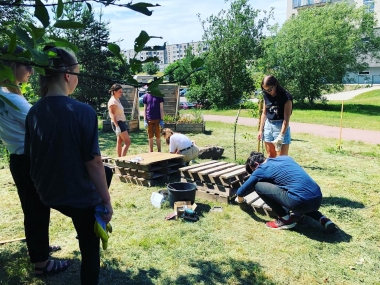VILNIUS TRANSFER STORY
Edited on
04 June 2021Gardening has wider impacts on the city that one would expect…
Implementing community gardens can be highly beneficial for a city not only for environmental purposes but also for social ones: to fight social exclusion and bring neighbours together, at the same time for the organization of educational activities for children around the urban garden. This is what Vilnius has done while transferring the Good Practice of Rome, in ‘sleeping districts’, with training for gardeners and setting up adequate urban management schemes.

Lithuania’s capital is particularly green, with 44% of its territory dedicated to forests, parks and squares. However, while family garden allotments persist from Soviet times, understanding of shared community gardens is still limited. The municipality owns various public spaces, including grounds of schools and kindergartens, but most vacant space in Vilnius is privately or state-owned. This has challenged the municipality’s capacity to promote urban agriculture. The shared urban garden initiatives that have existed so far have done so without city support. Meanwhile, most community groups lack the funding and permanent staff necessary to commit to gardening projects.
RU:RBAN gave Vilnius the knowledge to promote urban gardening as a way to fight social exclusion, and bring neighbours - even in high-rise ‘sleeping districts’ - together. The ULG focused on a key component of Rome’s practice – a clear set of regulations for communities to know how and where to start an urban garden. It was not a process of copy-paste, but of understanding and adapting. Nevertheless, thanks to the efforts of the group, the City Council approved a new set of rules and regulations for urban gardening in March 2021. In addition, the municipality released a guide to urban gardening which gained national media attention as part of a broader environmental awareness drive.
The practice developed by Vilnius following the experience of Rome is based strongly on environmental protection and awareness by developing urban gardens. Its social aspect is key as these gardens are actually “community” gardens, with all well-known and documented benefits for neighourhoods as groups and as individuals, such as mental health, socialisation, skills development etc. In particular trainings and sharing of seeds can have wider impacts on the local economy.
A new URBACT Local Group (ULG) was set up including gardening enthusiasts, NGOs, schools, the municipality, and the Environment Ministry. The members of Vilnius’ ULG benefited collectively and within their own specific fields from the experience and ideas of Rome and the other partner cities. This included gardeners sharing seeds and participating in “Gardenizer” trainings. It also involved “totally fascinated” city planners learning how Rome developed urban farming at a huge scale, right down to the smallest details of their financing model. ULG members also gained valuable knowledge about new communication tools, including through trainings in Riga where they learnt to use tools such as ‘vox pops’ and understand the value of their story for others.
The Municipality has also started a new strategic long-term program - CITY+ - aimed at recreating a sense of community in the former soviet districts. One of the important aspects is to create a feeling of ownership by allowing citizens to have their own yard and therefore an opportunity to create their small urban gardens. With around 60% of the city’s population living in these buildings, Vilnius’ new urban garden trend looks set to continue.
Vilnius implemented the practice from Rome by starting with one existing community garden and built from there. Gradually, the number of urban gardens in Vilnius started to grow. Furthermore, the model is now formally included in the city’s urban development policies. Another interesting aspect was that they linked the development of community gardens with ecological education and vegetable growing in kindergartens - an activity appreciated by partner cities during their study visit. Solving land ownership issues will remain a key challenge for the spread of urban gardening, requiring ongoing dialogue with private and state owners. To free up more land, Vilnius will also start discussions with the National Land Authority to allow communities temporary use of state-owned land for their urban garden initiatives.
As for its own land, the city will now be proposing the option of including an urban garden whenever it discusses green area renovation plans with communities. The municipality also expects to continue making further improvements to relevant legal procedures to facilitate urban gardens.
 Submitted by Patricia Hernandez on
Submitted by Patricia Hernandez on
